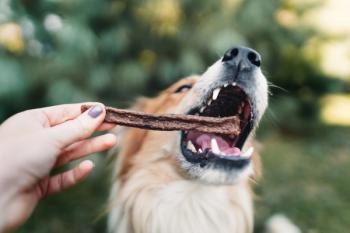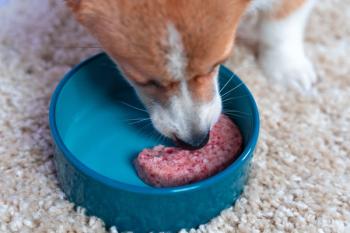
How to win client compliance and influence patients' weight loss
Your veterinary patient needs to lose a few pounds, now! Understanding clients' decision-making processes makes buy-in easier.
"Not so fast ..." The road to weight loss compliance can be quite rocky. (Getty Images)
As the importance of pet nutrition becomes more
Psychologists have developed several models that shape our understanding of how humans make changes in behavior to improve health. The stages of change model, also known as the transtheoretical model,2 can be used to assess a client's readiness to change their behavior.3
This model provides useful strategies to customize client recommendations because it encourages collaboration and provides an individualized plan to best suit a patient's needs. Implementing a weight loss plan when the client is ready will improve the efficacy of weight loss plans.
Identify the client's stage of change
Clients' openness to change can be categorized in one of the five stages:
1. Precontemplation-The client doesn't intend to take action in the next six months. Described as resistant, unmotivated or unaware, the client simply isn't ready to change.
2. Contemplation-The client is aware of the pros and cons of changing and intends to change in next six months but is stuck “thinking about it” and intends to change “soon.”
3. Preparation-The client plans to take action in the next month. Clients may have recognized the problem and sought advice from books, online or by talking to a pet store employee, trainer or veterinary professional.
4. Action-This client has taken action that's large enough to reduce risks for disease. For example, the client may have reduced treats or chosen a different pet food. However, the change wouldn't be considered significant unless it reduced calories by at least 10 percent and provided complete and balanced nutrition.
5. Maintenance-The individual continues action to prevent relapse.
Understand the change process
Veterinarians and veterinary team members can adapt their communication to a client's stage of readiness. If a client is in one of the early stages, you can wait to implement a weight loss plan. However, we shouldn't ignore the patient's obesity because it warrants monitoring and can negatively affect the pet's health. Use follow-up visits to support and educate clients while assessing when they become ready to change. It may take time and several visits to establish rapport and build the trust necessary to move the client along to the next stage.
Select a stage-appropriate intervention
Many weight loss programs fail because of a mismatch between the type of intervention and a client's readiness to change. Traditional programs are often action-oriented, while most clients may not yet be in the action stage.
When a partnership is formed with the client, you create an environment that supports change. By understanding the stages of change, you can help move the client from thinking to doing.
Selecting the right intervention at the right time for the right client can improve the clinical outcome. Successfully managing obesity can change a frustrating problem into a rewarding solution. The pet achieves greater health and an improved quality of life, and pet owners become loyal clients because they've been active partners in the healthcare plan.
References
1. Abood SK. Increasing adherence in practice: making your clients partners in care. Vet Clin North Am Small Anim Pract 2007;37:151-164.
2. Shumaker SA, Ockene JK, Riekert KA. The transtheoretical model of behavior change. In: The handbook of health behavior change, 3rd ed. New York: Springer; 2009;59-84.
3. Buffington T, Holloway C, Abood S. Contemporary issues in clinical nutrition. In: Manual of veterinary dietetics. St. Louis: Saunders, 2004;143-162.
Dr. Churchill is an associate professor in companion animal nutrition with the University of Minnesota's Veterinary Medical Center.
Newsletter
From exam room tips to practice management insights, get trusted veterinary news delivered straight to your inbox—subscribe to dvm360.






